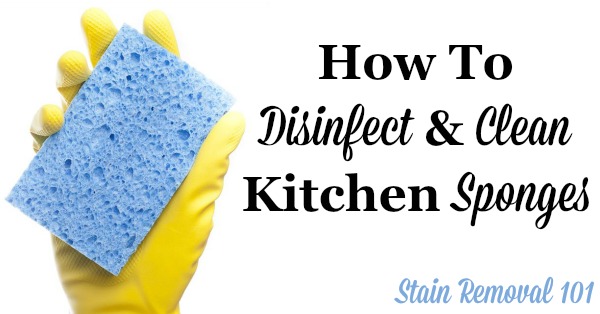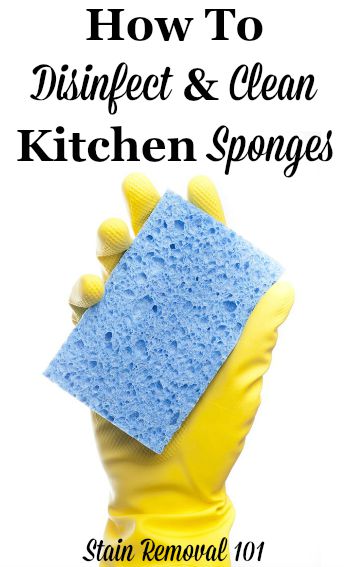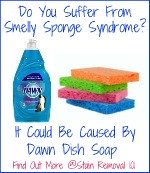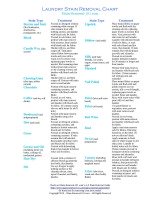How To Clean Sponge In Microwave

Below are instructions for how to disinfect and clean sponges, such as those you use in the kitchen daily.
If you use your sponges to wash your dishes, pots and pans, as well for other cleaning tasks in your kitchen, such as wiping down kitchen counters, it is important that you clean and disinfect them regularly, because otherwise you're trying to clean a surface with something dirty.
You'd never use a dirty rag to wash your dishes, so make sure you're not doing something similar with a dirty sponge.
How Often Should You Clean Your Sponges?
At a bare minimum you should clean and disinfect your sponges once a week using one of the methods listed below, but some do it even more frequently, sometimes nightly.I would personally lean toward doing it at least every 2-3 days.
I would also do it anytime it begins to have a smell. Smells often indicate bacterial growth, so if you have a stinky sponge clean it!
But whether it smells or not, your sponges should be cleaned regularly.
There are many ways to clean sponges, including the most popular methods which I've discussed in more depth below of using the microwave or your dishwasher.
How To Clean & Disinfect Kitchen Sponges In The Microwave
This is the method I personally use for cleaning my kitchen sponges.Place your sponge in the microwave, while damp, and heat it for 1-2 minutes. This heats the water inside the sponge to boiling, and the boiling water kills the bacteria and other yuckies in the sponge.
For this method to work the sponge must be damp, not dry. If it is dry there is no water in the sponge to boil, plus you could start a fire in your microwave.
Once the sponge has been heated in this manner you need to exercise caution when taking it out of the microwave because it will be scalding hot.
I always let it cool again for a couple of minutes, just letting it sit right in the microwave, before I pick it back up.
Here's a video with the same instructions I've provided:
If you don't have a microwave another similar method for disinfecting your sponges is to put them in boiling water for a couple of minutes. Just make sure to somehow submerge the sponge, instead of it floating on top, so all surfaces of the sponge get superheated to kill germs.
Below I've provided instructions for yet another method to clean sponges, using your dishwasher.

Top photo by Horia Varlan
Clean Sponges In The Dishwasher: Fixed My Stinky Problem

Another popular method for cleaning your kitchen sponges is to run them through the dishwasher.
This works as long as the sponges can get hit with the jets of extremely hot water that your dishwasher uses to clean dishes.
If your sponges are a bit smelly this is a simple method to clean them while cleaning the rest of your kitchen. Just load your dishwasher like normal and put your sponges on the top rack and run like normal.
Some people put the sponges down in the silverware tray when they use this method. It will work, again, as long as the spray jets for the dishwasher can hit the sponge consistently. But the lower rack of your machine is rougher on things than the top rack, and so it can beat up your sponge and make it not last as long from the extra wear and tear.
That's another reason I personally prefer the microwave method. It doesn't physically cause as much wear and tear on the sponge, meaning it can last longer than the putting it in the dishwasher method.
Lisa said: "Dawn made my sponges and dish rags stink as well. I didn't even think it could be the soap until I stumbled onto this website!
I will be changing to something more eco-friendly I think.
But what I was doing to get rid of the smell was to toss the sponges in the dishwasher every other time I ran a load...Bad smell gone!"
If you don't know what we're talking about with stinky sponges caused by certain dish soaps, check out all the readers who've experienced Dawn dish soap causing smelly sponges and dishcloths here.
What About Washing Sponges In The Washing Machine?
***Update: After publishing this tip about using your dishwasher for cleaning your sponges I got comments from several readers who instead of tossing them in the dishwasher throw them in the washing machine. You can read their ideas in the comments for yet another method for cleaning your sponges.I think this method would also work, but I also think it is even physically harder on your sponges, and may make them disintegrate or break apart more quickly. So just keep that in mind if you want to try this method.***End Update
So how do you clean this common kitchen item? I'd love to hear so tell me in the comments below.
You can also read reviews of kitchen and cleaning sponges here to find a brand that will work well for you.
Photo courtesy of brownpau
Related Pages You May Enjoy
House Cleaning Tips For Busy MomsDishwashing Soap Reviews & Experiences
Tips For Cleaning The Microwave
Go From How To Disinfect And Clean A Sponge To Home Page
Comments for Clean Sponges In The Dishwasher: Fixed My Stinky Problem
|
||
|
||
|
||
|
||
|
||
|
||
|
||
|
||
|
||
|
||
|
||
|
||
|
||
|
||
|
||
|
||
|
||
|
||
|
||
|
||
|
||
|
||
|
||
|
||
|
||
|
||
|
||
|
||
|
||
Thanks For Visiting My Website: Grab Your Free Gift!

Hi, I'm Taylor, a busy mom with 3 kids, so I have lots of hands on experience with house cleaning, laundry and my fair share of spots, spills and other messy catastrophes. Thanks for visiting my site.
I update the website all the time with tips, tutorials, cleaning recipes, reviews of products from readers like you, and tests I've done on various cleaners, removers and laundry supplies.
I'd love to give you a gift! When you subscribe to my free weekly newsletter you will receive a free printable laundry stain removal chart that you can reference as needed.
I hope you enjoy this gift, and stop by again soon!
CAUTION: This website is provided for informational purposes only. It is provided as is, without warranties or guarantees. Some stains and messes just won't come out, and are permanent. Further, some cleaning methods can harm your item, so if what you want to clean or launder is sentimental or expensive call a professional. See disclaimer of liability for more information.
Let's Stay Connected!
Get Free Email Updates
(and get a FREE printable)
Related Pages
 Visit Household Management 101
Visit Household Management 101
 Visit Home Storage Solutions 101
Visit Home Storage Solutions 101







